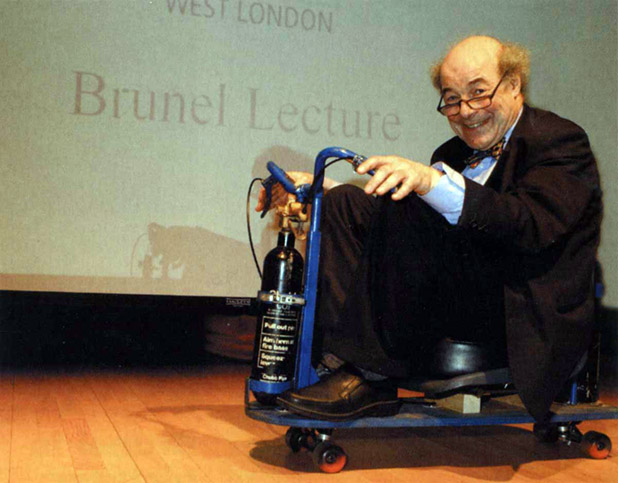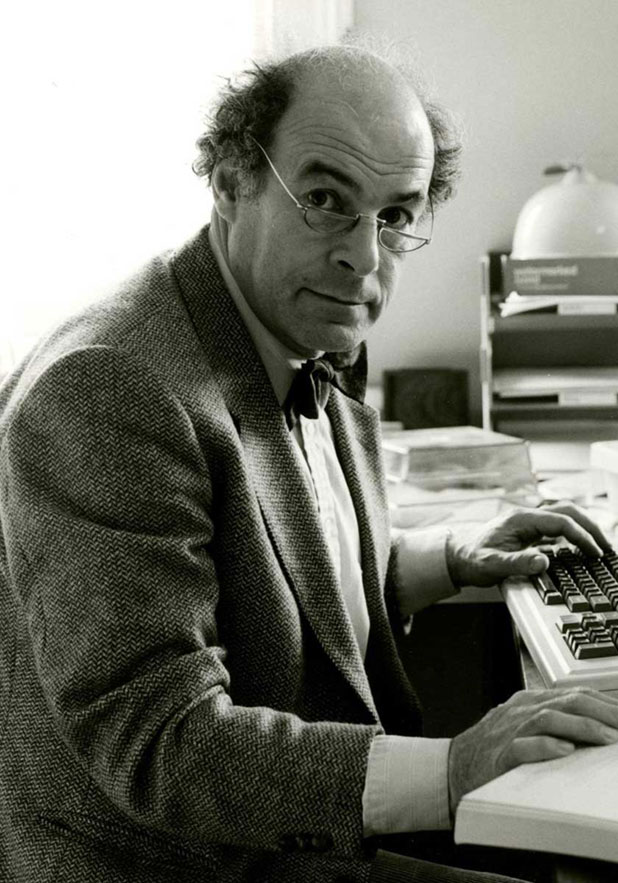Professor Heinz Wolff, who has died aged 89, was a pioneer of bioengineering, inventor, TV presenter and social reformer.
His trademark bow tie, memorable German accent and ebullient persona endeared Prof Wolff to British television audiences in the 1970s and 1980s, including on the popular BBC programme, The Great Egg Race, which ran for eight series.
His inventiveness and intellect powered a 60-year career in scientific research, with much of his early career spent in bioengineering – a discipline which he established and named. Following thirty years working for the Medical Research Council, he founded the Brunel Institute for Bioengineering in 1983, and in recent years, as an emeritus professor at Brunel University London, worked on a time-banking scheme which aims to solve the elderly care crisis.
Colleague and close friend Professor Ian Sutherland, who took over directorship of the Institute when Professor Wolff retired, said: “Heinz was a most inventive and inspirational leader. There was nothing he loved more than having a team of people around him devising completely new ways of doing things.”
A self-confessed practical joker, Prof Wolff regularly invented gadgets – not only to explain scientific concepts, but also for friends and colleagues – and arrived at his 80th birthday celebrations at Brunel on a scooter propelled by fire extinguishers.

Heinz Siegfried Wolff was born in Berlin on 29 April 1928. At the age of 11, he arrived in the UK with his family on the day that World War Two broke out. He attended school in Oxford and then worked in haematology at the city’s Radcliffe Infirmary, where he invented a machine for counting patients’ blood cells, before joining the Pneumoconiosis Research Unit near Cardiff.
Prof Wolff later graduated from University College London with a first-class degree in Physiology and Physics. He married his staff-nurse sweetheart Joan in 1953, and the following year invented bioengineering: the application of engineering principles to biological and medical sciences.
Speaking in 2016 of his first brush with popular science, Prof Wolff said: “My TV work began in 1966 on Panorama with Richard Dimbleby, where I produced a radio pill that could measure pressure, temperature and acidity in the gut.
“Richard swallowed one and when I gently poked him, the radio receiver squealed appropriately. The BBC had faith in me because I didn’t need a script and I was comfortable talking in front of a camera lens.”
Prof Wolff’s 20-year TV and radio career encompassed the invention-focused shows Young Scientist of the Year and The Great Egg Race, which had teams from industry and universities competing to make the most innovative gadget from a selection of materials. He gave the televised Royal Institution Christmas Lectures in 1975, in which he explained how doctors examine the insides of their patients without breaking the skin. His fame for inspiring young scientific minds continued with the 2008 puzzle video game Professor Heinz Wolff’s Gravity, and in 2009 with Britain’s Bright Ideas, a competition for the best energy-saving inventions.
Alongside his television appearances, Prof Wolff’s scientific career continued to flourish, including research for the National Institute for Medical Research and the Medical Research Council. An honorary member of the European Space Agency since 1975, his research into how human beings could survive in hostile environments culminated in his co-founding of Project Juno which, in 1991, led to Dr Helen Sharman becoming the first Briton in space.
The Brunel Institute of Bioengineering, under Prof Wolff’s directorship, also developed the concept for a general-purpose experimental facility known as the Glovebox, giving astronauts the ability to perform experiments safely in space.
Prof Wolff led the Institute until his retirement in 1995, but continued to work four to five days a week on research and lectures as an emeritus professor. In February 2016, Wolff and his colleague, Brunel’s Dr Gabriella Spinelli, launched ‘Give and Take Care’, a £1 million government-funded venture which, based on reciprocity and intergenerational care, enables volunteers to support someone in their community so as to receive the same later in life.
Dr Spinelli commented: “Give and Take Care was Heinz’s last and ultimate passion. Despite not being an expert in health or social care by his own acknowledgment, he worked as hard on it has on any of his previous endeavours to actualise an innovative solution for the older adults’ social care crisis.
“Working with Heinz was like being at the centre of an ideas factory; he was fiercely curious and always had new avenues to explore.”
Prof Wolff’s accolades include honorary doctorates from several universities, as well as fellowships of the Biological Engineering Society, the Institution of Electrical Engineers, the Institute of Biology, the Royal College of Physicians and the Royal Society of Arts. In 1992, he was awarded the Edinburgh Medal for outstanding contribution by a scientist to society.
He was also a strong supporter of local charities, including over 25 years as a trustee and then Life President of the Hillingdon Partnership Trust.
"Heinz's remarkable intellect, ideas and enthusiasm combined to make him the sparkling scientist we will so fondly remember," said Professor Julia Buckingham, Vice-Chancellor and President of Brunel University London. "He was a wonderful friend and supporter to staff and to students – and an inspiration to all of us."
Sir Peter Medawar, Nobel Laureate and Prof Wolff’s colleague at the Medical Research Council, dedicated one of his books with the inscription ‘To Heinz Wolff – something of a genius’.
As a problem-solver and communicator, Prof Wolff was indeed something of a genius.
Professor Heinz Wolff died of heart failure on 15 December 2017, aged 89. He was widowed in 2014, and is survived by his two sons and four grandchildren.

Reported by:
Joe Buchanunn,
Media Relations
+44 (0)1895 268821
joe.buchanunn@brunel.ac.uk